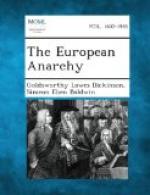What Baron Guillaume thought plausible must not the Germans have thought plausible? Must it not have confirmed their belief in the “inevitability” of a war—that belief which, by itself, has been enough to produce war after war, and, in particular, the war of 1870? Must there not have been strengthened in their minds that particular current among the many that were making for war? And must not similar suspicions have been active, with similar results, on the side of France and Russia? The armaments engender fear, the fear in turn engenders armaments, and in that vicious circle turns the policy of Europe, till this or that Power precipitates the conflict, much as a man hanging in terror over the edge of a cliff ends by losing his nerve and throwing himself over. That is the real lesson of the rivalry in armaments. That is certain. The rest remains conjecture.
[Footnote 1: “L’Allemagne avant la guerre,” p. 75, and British White Paper, No. 160.]
[Footnote 2: The account that follows is taken from the “Autobiography” of Andrew D. White, the chairman of the American delegation. See vol. ii., chap. xiv. and following.]
[Footnote 3: Mr. Arthur Lee, late Civil Lord of the Admiralty, at Eastleigh:—
“If war should unhappily break out under existing conditions the British Navy would get its blow in first, before the other nation had time even to read in the papers that war had been declared” (The Times, February 4, 1905).
“The British fleet is now prepared strategically for every possible emergency, for we must assume that all foreign naval Powers are possible enemies” (The Times, February 7, 1905).]
[Footnote 4: Sir Edwin Pears, “Forty Years in Constantinople,” p.330.]
12. Europe since the Decade 1890-1900.
Let us now, endeavouring to bear in our minds the whole situation we have been analysing, consider a little more particularly the various episodes and crises of international policy from the year 1890 onwards. I take that date, the date of Bismarck’s resignation, for the reason already given (p. 42). It was not until then that it would have occurred to any competent observer to accuse Germany of an aggressive policy calculated to disturb the peace of Europe. A closer rapprochement with England was, indeed, the first idea of the Kaiser when he took over the reins of power in 1888. And during the ten years that followed British sympathies were actually drawn towards Germany and alienated from France.[1] It is well known that Mr. Chamberlain favoured an alliance with Germany,[2] and that when the Anglo-Japanese treaty was being negotiated the inclusion of Germany was seriously considered by Lord Lansdowne. The telegram of the Kaiser to Kruger in 1895 no doubt left an unpleasant impression in England, and German feeling, of course, at the time of the Boer War, ran strongly against England, but so did feeling in France




